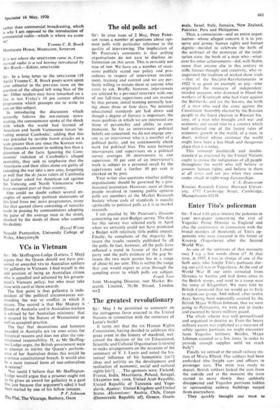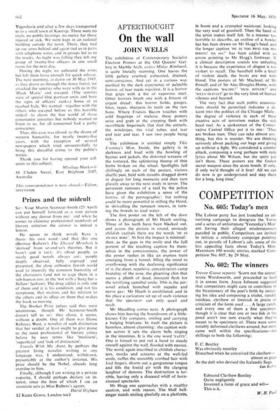Enter Tito's policeman
Sir: I read with great interest the polemics in your newspaper concerning the visit of Yugoslav Prime Minister to England and also the controversy in connection with the brutal murders of thousands of Tito's op- ponents who were executed in the forest of Kocevje (Yugoslavia) after the Second World War.
As one of the survivors of that massacre may I say a few words about it? At that time, in 1945, I was in charge of one of the Serb units who fought Tito's partisans dur- ing our civil war in Yugoslavia. At the end of World War II our units retreated from Slovenia to Austria and laid down arms to the British troops, and went to a camp near the town of Klagenfurt. We were told by British Command that we would go to Italy to rejoin our group. And indeed, after twelve days, having been repeatedly assured by the British Major William Johnson, that we were going to Palmanova, we were put in trucks and escorted by heavy military guard.
The whole scheme was well premeditated and organised to deceive us. Even the heavy military escort was explained as a measure of safety against partisans we might encounter from Yugoslav territory. Besides, Major Johnson counted us a few times 'in order to provide enough supplies until we reach Italy'!
Finally we arrived at the small railway sta- tion of 'Maria Elland. Our soldiers had been embarked into freight cars and officers in passenger cars. The train was ready to depart, British soldiers locked the cars from the outside and at the moment the train started to move slowly they suddenly disappeared and Yugoslav partisans hidden in surrounding railway buildings surged from everywhere.
They quickly brought our train to Yugoslavia and after a few days transported us to a small town of Kocevje. There were no trials, no public hearings, no mercy for those injured or sick. We were kept in an isolated building outside the town. There, they tied up our arms behind and again tied us in pairs with telephone wires, and in groups led us to the trucks. As night was falling they left my group of twenty-five officers in one small room for the next day.
During the night we unbound the wires but left them loose enough for quick release. The next morning, at dawn on 30 May 1945, as they drove us through the dense forest, we attacked the sentries who were with us in the 'Black Maria' and escaped. (The sentries were of special elite partisan units and bore the signs of officers' ranks.) Some of us reached Italy. We wanted—together with the others who escaped before us this horrible ordeal—to alarm the free world of those communist atrocities but nobody wanted to listen to us, for all concerned had a guilty conscience.
Thus, this case was closed, to the shame of western humanity, for nearly twenty-five years, with the exception of several newspapers which tried unsuccessfully to bring this dreadful crime to the public's notice.
Thank you for having opened your col- 44 Cluden Street, East Brighton 3187, Australia
This correspondence is now dosed.—Editor, SPECTATOR



































 Previous page
Previous page